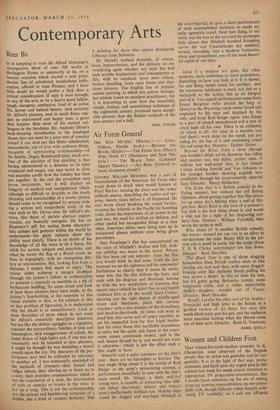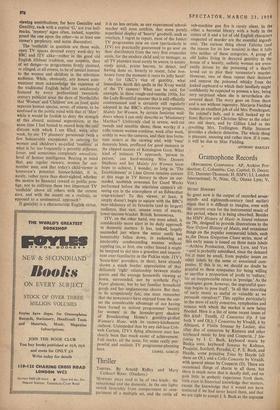Women and Children First
THAT valiant-for-truth modern crusader, G. K. Chesterton, once observed of the English people that its virtue was geniality and its vice gentility. It is in the light of that sage, poetic comment, and hard upon my urgent plea in this column last week for much stricter attention to appropriate TV programme-presentation, that I would focus attention, on the eve of resting from my viewing responsibilities, on two poten- tially rich, though hitherto rather loosely culti- vated, TV 'outfields,' as I call our off-peak
viewing contributions; for here Geniality and Gentility, each with a capital `G,' are true hall- inarks, 'mystery' signs often, indeed, superim- posed the one upon the other—to at least one viewer's perplexity, and acute discomfort.
The 'outfields' in question are those wide, open TV spaces devoted every week-day by BBC and ITV alike—rather in the good old English lifeboat tradition, one suspects, than of set design—to programmes firmly claimed, or alleged, at all events, to be of special interest to the women and children in the television audience. While, obviously, any honest com- mentator must acknowledge the existence of the traditional English belief (so assiduously fostered by every professional twentieth- century publicist since the days of Northcliffe) that 'Women' and 'Children' are, au fond, quite separate human species, never, of course, to be confused in the public mind with that of `Men'; while it would be foolish to deny the strength of this absurd, national superstition, at the same time I feel bound to record here the real distaste with which I am filled, week after week, by our TV planners' persistence (with a few honourable exceptions) in catering for women and children's so-called 'interests' at what is far too frequently a patently different, lower, and sometimes completely unrealistic. level of human intelligence. Bearing in mind that, qua regular viewers, women far out- number men, and that today's child-viewer is tomorrow's potential licence-holder, it is, surely, rather more than short-sighted, whether the motive be financial reward or public pres- tige, not to cultivate these two important TV 'outfields' above all others with the utmost care, and with the accent on a realistic, as opposed to a sentimental, approach?
if geniality is a characteristic English virtue, it is no less certain, as any experienced school- teacher will soon confirm, that some purely superficial display of 'hearty' goodwill, such as overlays, I regret to report, most of the Junior TV programmes now on view (particularly in ITV) are practically guaranteed to go sour on their distributors from the very first avuncular smile, for the modern child and/or teenager, as all TV planners must surely be aware, is notori- ously quick, praise heaven, to detect, and having done so, bitterly to resent, false bon- homie from the moment it rears its jolly head!
As for GKC's vice of gentility, what immediate death this spells in the X-ray world of the TV camera! What can be said, for example, in these rough-and-tumble 1950s, for the Lady-Bountiful manner that is still officially countenanced and is certainly still regularly adopted in the BBC's afternoon programmes, Mainly for Women, by certain feminine well- doers whom I can only describe as 'Missionary Marthas'? Uniformly clad in severe, well-cut tweeds and sensible shoes, these worthy if a trifle remote women continue, week after week, archly to woo the cameras, and their less fortu- nate sisters at the viewing end, with 'twee' domestic hints, proffered for good measure in the clipped accents of Kensington Gore. What kind of intimate TV approach, 'person to person,' can hard-working Miss Doreen Stephens and her Mainly for Women team hope to achieve, I wonder, as long as 'The Establishment' at Lime Grove remains content at this stage in TV history to show an out- moded, snobbish reverence for Good Works performed before the television camera's all- seeing eye in the atmosphere of an Edwardian soup-kitchen? To this viewer, at least, it simply doesn't begin to equate with the BBC's near-idolatory of its favourite (and its largest) audience, that vast, unseen army of sturdy, lower-income-bracket British housewives.
ITV, on the other hand, one must admit, is considerably more alert in its daily approach to domestic matters. It has, indeed, largely succeeded just where the senior outfit has lamentably fallen down, in eschewing . an intolerably condescending manner without toppling (as, at first, one rather feared it might be tempted to do) into a graceless and imperti- nent over-familiarity in the Pickles style. ITV's 'home-hint' providers, in short, have already shown a much livelier appreciation of that delicately 'right' relationship between studio guests and the average housewife viewing at home, surrounded, not by synthetic Peg's Paper glamour, but by her familiar household gootjs and her unglamorous chores. But then, to be scrupulously fair, one must remember that the newcomers have enjoyed from the out- set the considerable advantage of not having been forced to initiate programmes 'mainly for women' in the lavender-grey shadow of Broadcasting House's gentility-girdled Woman's Hour, with its rectory-kitchenette outlook. Unimpeded thus by any old-lace Cob- web Curtain, ITV's flying afternoon' start has clearly been that much easier of achievement. Full marks, all the same, for some really pur- poseful and realistic TV programme-planning



































 Previous page
Previous page